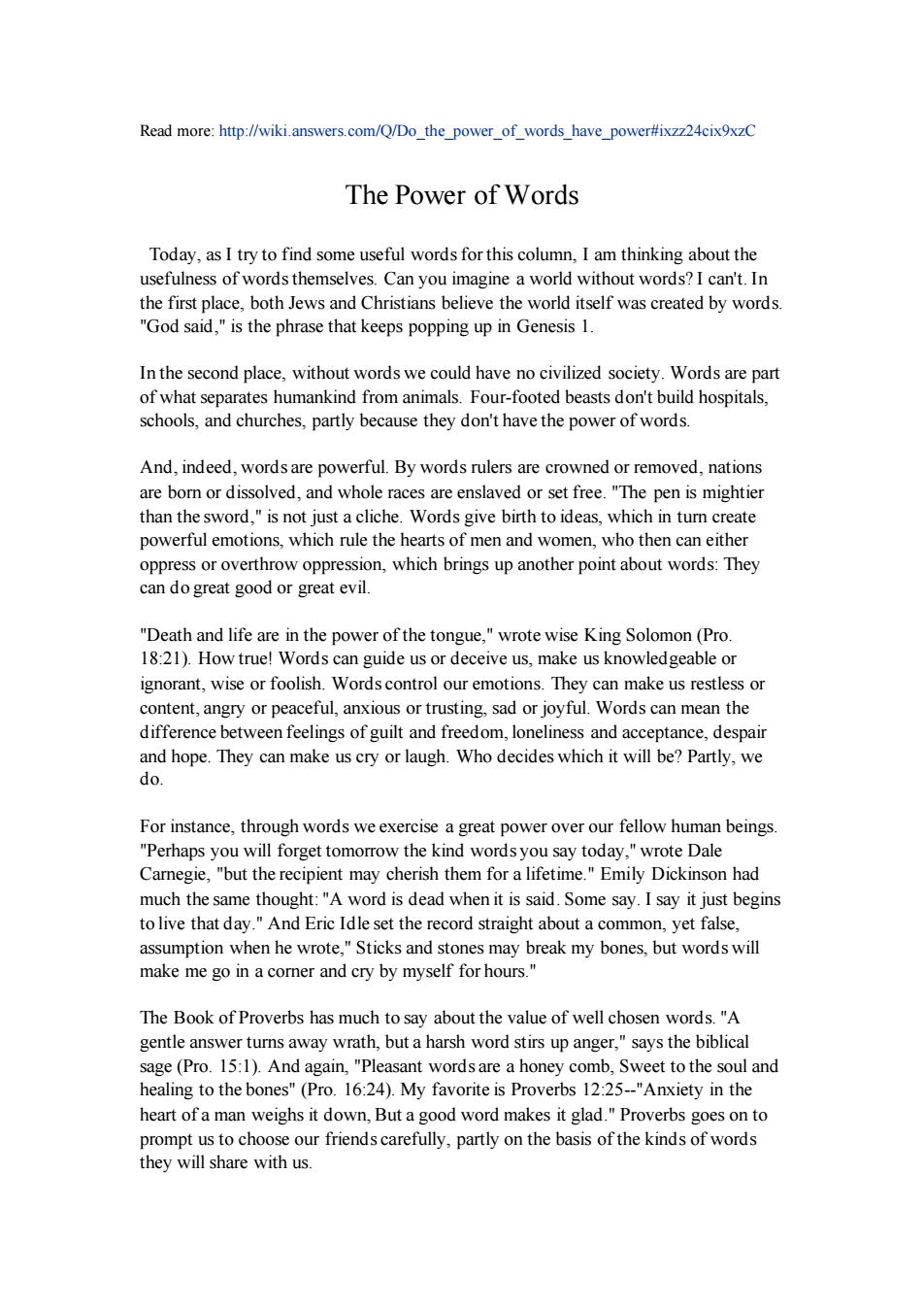正在加载图片...

Read more:http://wiki.answers.com/Q/Do the power of words have power#ixzz24cix9xzC The Power of Words Today,as I try to find some useful words for this column,I am thinking about the usefulness of words themselves.Can you imagine a world without words?I can't.In the first place,both Jews and Christians believe the world itself was created by words "God said,is the phrase that keeps popping up in Genesis 1. In the second place,without words we could have no civilized society.Words are part of what separates humankind from animals.Four-footed beasts don't build hospitals, schools,and churches,partly because they don't have the power of words And,indeed,words are powerful.By words rulers are crowned or removed,nations are born or dissolved,and whole races are enslaved or set free."The pen is mightier than the sword,"is not just a cliche.Words give birth to ideas,which in turn create powerful emotions,which rule the hearts of men and women,who then can either oppress or overthrow oppression,which brings up another point about words:They can do great good or great evil. "Death and life are in the power of the tongue,"wrote wise King Solomon(Pro. 18:21).How true!Words can guide us or deceive us,make us knowledgeable or ignorant,wise or foolish.Words control our emotions.They can make us restless or content,angry or peaceful,anxious or trusting,sad or joyful.Words can mean the difference between feelings of guilt and freedom,loneliness and acceptance,despair and hope.They can make us cry or laugh.Who decides which it will be?Partly,we do. For instance,through words we exercise a great power over our fellow human beings. "Perhaps you will forget tomorrow the kind words you say today,"wrote Dale Carnegie,"but the recipient may cherish them for a lifetime."Emily Dickinson had much the same thought:"A word is dead when it is said.Some say.I say it just begins to live that day."And Eric Idle set the record straight about a common,yet false, assumption when he wrote,"Sticks and stones may break my bones,but words will make me go in a corner and cry by myself for hours." The Book of Proverbs has much to say about the value of well chosen words."A gentle answer turns away wrath,but a harsh word stirs up anger,"says the biblical sage (Pro.15:1).And again,"Pleasant words are a honey comb,Sweet to the soul and healing to the bones"(Pro.16:24).My favorite is Proverbs 12:25--"Anxiety in the heart of a man weighs it down,But a good word makes it glad."Proverbs goes on to prompt us to choose our friends carefully,partly on the basis of the kinds of words they will share with us.Read more: http://wiki.answers.com/Q/Do_the_power_of_words_have_power#ixzz24cix9xzC The Power of Words Today, as I try to find some useful words for this column, I am thinking about the usefulness of words themselves. Can you imagine a world without words? I can't. In the first place, both Jews and Christians believe the world itself was created by words. "God said," is the phrase that keeps popping up in Genesis 1. In the second place, without words we could have no civilized society. Words are part of what separates humankind from animals. Four-footed beasts don't build hospitals, schools, and churches, partly because they don't have the power of words. And, indeed, words are powerful. By words rulers are crowned or removed, nations are born or dissolved, and whole races are enslaved or set free. "The pen is mightier than the sword," is not just a cliche. Words give birth to ideas, which in turn create powerful emotions, which rule the hearts of men and women, who then can either oppress or overthrow oppression, which brings up another point about words: They can do great good or great evil. "Death and life are in the power of the tongue," wrote wise King Solomon (Pro. 18:21). How true! Words can guide us or deceive us, make us knowledgeable or ignorant, wise or foolish. Words control our emotions. They can make us restless or content, angry or peaceful, anxious or trusting, sad or joyful. Words can mean the difference between feelings of guilt and freedom, loneliness and acceptance, despair and hope. They can make us cry or laugh. Who decides which it will be? Partly, we do. For instance, through words we exercise a great power over our fellow human beings. "Perhaps you will forget tomorrow the kind words you say today," wrote Dale Carnegie, "but the recipient may cherish them for a lifetime." Emily Dickinson had much the same thought: "A word is dead when it is said. Some say. I say it just begins to live that day." And Eric Idle set the record straight about a common, yet false, assumption when he wrote," Sticks and stones may break my bones, but words will make me go in a corner and cry by myself for hours." The Book of Proverbs has much to say about the value of well chosen words. "A gentle answer turns away wrath, but a harsh word stirs up anger," says the biblical sage (Pro. 15:1). And again, "Pleasant words are a honey comb, Sweet to the soul and healing to the bones" (Pro. 16:24). My favorite is Proverbs 12:25--"Anxiety in the heart of a man weighs it down, But a good word makes it glad." Proverbs goes on to prompt us to choose our friends carefully, partly on the basis of the kinds of words they will share with us